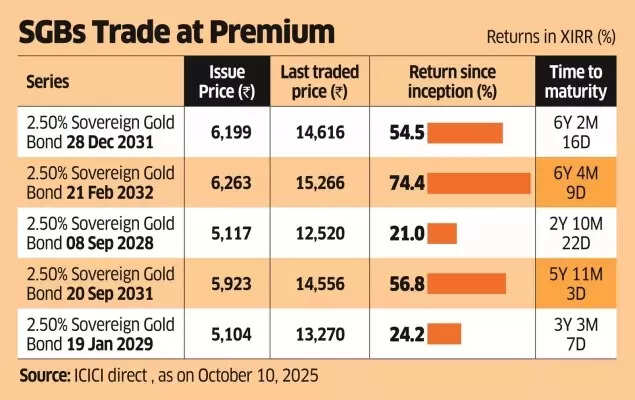
Ahead of Diwali and Dhanteras, gold prices have been skyrocketing this festive season. Investors are looking at investment avenues – and Sovereign Gold Bonds (SGBs) are gaining huge traction in the secondary market. SGBs offer an eight-year investment period with a 2.5% yearly interest rate, featuring tax exemption at maturity without any storage fees or expense ratios. Each unit corresponds to one gram of gold.
Craze for Sovereign Gold Bonds
SGBs are witnessing heightened interest from retail investors in the secondary market, who are trading these government-issued gold-linked securities at prices significantly above the current gold rates, according to an ET report.Individual investors paid up to 32% above the metal’s market price last week, amidst rising gold values. Such elevated premiums expose these investors to substantial risks should gold prices decline, the report noted.Trading data shows the SGB Feb 32 IV series, which was issued in February 2024 with maturity in February 2032, reached ₹15,266 on NSE on October 10, exceeding the spot gold price by 26%. Similarly, the SGB Dec 31 III traded at ₹14,556 per gram, showing a 20% premium. IBJA reported the spot gold price at ₹12,085 per gram on that day.

SGBs Trade at Premium
Experts note that retail investors accept these higher prices due to benefits like yearly interest payments, absence of fund management charges unlike mutual funds, and tax-exempt capital gains at maturity. Plus, the government stopping issuance of fresh SGBs has also affected market dynamics.“Due to limited supply, the impact cost goes up if there is a large purchase, pushing up prices,” says Sandeep Raichura, CEO – retail broking & distribution, PL Capital. He warns that a potential cooling in gold enthusiasm could create difficulties in secondary market exits, potentially eliminating premiums and resulting in losses.“Retail Investors have had a good experience with the earlier series of SGBs. Since there are no fresh issuances in primary markets now, retail investors are drawn towards the secondary markets,” said NS Ramaswamy, head of commodities and CRM, Ventura Securities.
Should you buy SGBs in secondary markets?
Wealth managers recommend thorough calculation before purchasing these bonds from the secondary market. Investors should evaluate the remaining tenure, interest returns and premium costs prior to making investments. Ramaswamy indicated that present premium rates are excessive considering the fixed duration and low liquidity of these instruments, cautioning that elevated premiums could diminish overall returns.The recent increase in demand is attributed to gold prices rising by 60% in rupee terms within a year. Emerging market central banks have been actively purchasing gold to reduce their dependence on US dollar reserves. Individual investors have also started investing in gold as protection against geopolitical uncertainties and trade-related concerns.Experts express reservations about secondary market SGB investments. “You cannot stagger using SIPs, there is no assurance of liquidity, and since the maximum tenure is only eight years, you cannot hold them beyond maturity,” said Pranab Uniyal, head, HDFC Tru, the wealth advisory arm of the HDFC group.According to Uniyal, gold ETFs are preferable due to their superior liquidity and accurate price reflection of the underlying metal. Several market intermediaries have highlighted concerns about SGB liquidity, cautioning investors about potential difficulties in achieving fair value exits in the secondary market.






